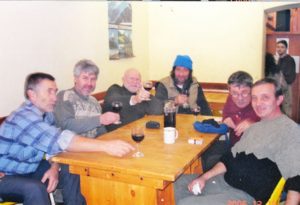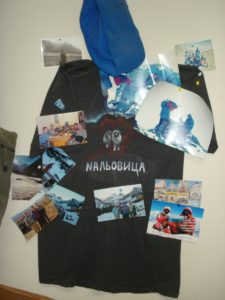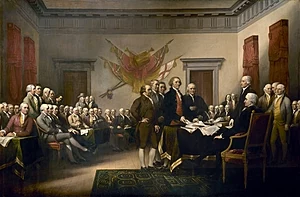As I noted in my free book offering at another section of this site, my wife suddenly decided to end her business association of nearly 20 years with AmazonBooks, and decided to chuck close to a thousand volumes we had acquired from a variety of sources, their ages ranging from the 1700s to modern times. I sorted through all of them, and kept those that interested me most to sell at my own eBay site, “DesertPete4”, where I offer a small mix of old books and militaria and politica I’d picked up in my 17 years of travel to the Russias and the Balkans.
I set that business line up in the late 90s to help pay some of my travel costs since my client base over there weren’t exactly what you would call “entrepreneurs”.
But I did get to hear their stories.
The couple on the left were Zlatko and Slavka, goat-herders who provided very private storage space way out near the river levees for Mitko’s more expensive inventories (which I had first dibs), with only big dog security. I often visited them, and we would sit at that small table on the porch in the background and speak of many things. Their son worked for Mitko, and I told their story here in 2015.


Another story I haven’t written yet is about that guy in the blue cap…lost his wife and a few toes in the Himalayas, and the State had given him the job of managing this mountaintop chateau at the top of their Mount Malovitza. On the way down the mountain after this gathering he rushed down the trail on a snowmobile to give me a T-shirt, and, in return I gave him that blue Patagonia knit cap with ear flaps on the table. He cried, such luxury!, and then gave me that old knit cap on his head. Another fellow at that table was Bulgaria’s most famous alpinist, name, Arso Arsoss, who was chased by two pretty girls in the inn asking him to autograph the book he had written. (Turns out that was my last climb.)

By 2000, the American interest in books had taken a steep decline, and, without inquiring into what it was that replaced those interests, I quit acquiring books, as they were no longer an investment value. Books valued at 100’s of dollars suddenly couldn’t fetch bids. Millennials (GenY) then were in their early 20s, Gen Z barely school-aged, many not yet born, and Gen Alpha not even a glimmer in their old mans’ eyes. Both my sons, GenX, love to read, you know, real books, and both have nice libraries, many of those books suited to their times. My youngest, born in Japan, and my oldest, having spent some very formative years there, both have nice collections of those big classical Japanese graphic novels about cartoon heroes (good investments), but also an array of literature (e.g. Kipling), history, much of which I’d introduced to him, and in my oldest’s case, a good collection of modern treatises on religious philosophy his mother had introduced.
Thinking I had lessons to share, I gave up foreign adventuring in 2008, at age 63, and turned to writing about the things I had seen and the types of people I had come to know, for in listening to them tell their stories, not unlike listening to a bunch a plant-workers talking about cutting tobacco, coal miners about life underground, or, ex-Army platoon leaders recalling fire fights or their conscientious objecting medics in Vietnam, it dawned on me that life is memories, and memories are the true resume enhancements to history.
Memories spawn reading history books a little deeper.
I figured that having spent almost 20 years looking at life in some very culturally and politically historical places from the bottom-up, instead of being a part of the cocktail circuit fraternity where everything is top-down, I had some special insights to share about the bottom.
Turns out, my better insights may not be about the special nature of Ukrainians, Russians, Bulgarians or Macedonians, but instead, about “Natural Law” and “How Things Work”, and the declining nature of educated, professional Americans whose worldview has been reduced to 280 characters and an almost catastrophic inability to connect history to ordinary life going back more than a single generation…and the role that memories play in shaping our own personal resumes.
Having been raised in a coal camp and the older tradition, my own stories go back to lessons that were observed by me as early as 12, going back to 1957 when an old woman named Hag Ramsey shooed my mother out of her front yard with a shotgun because she was trying to deliver a charity food basket from our church. I wrote that story here, “Nehi Grape and Moon Pies” ten years ago, and actually published a book at Amazon, in Kindle format, entitled Famous Common People I Have Known (2015). (Apparently it’s still available although I’ve never seen a nickle in royalties.) Since I have several yarns to add to those, I’d love to find a publisher to put that in print form, because, you see, at 75 now, the urge to take care of unfinished business (hence the title) comes over me like pulling the curtains in the front room every time I watch “Breakfast at Tiffany’s”… when I realize that Audrey Hepburn was only 32 then (in 1961), JFK was president then, and only 44, and I was 16. I was a senior, and in the school auditorium at a football pep rally (state championship) in our school’s first year of integration when our principal stepped up to the podium to announce that “President Kennedy had been shot”. A collective gasp went up, and school was immediately dismissed and we had to hurry home to watch NBC announce that the President had died. Even my mother was devastated and she didn’t like Catholics one bit.
That was 1963, when everyone knew where they were when JFK was assassinated. And through that reflection a hundred more associated memories rush forward having nothing to do with politics but about the times, as remembered by a 17-year old. But in a few short years my entire generation will have passed away, just as nearly every American who can recall that first December 7, 1941 radio broadcast has passed…
…which I first heard this as kid in an old movie.)
But I don’t think 9/11 was seared into the souls of younger Americans. Just under 7000 military members have died in Afghanistan and Iraq, AQ is still alive and well, as are other jihadi groups, each with their own benefactors, only, unlike Americans who watched the Axis powers rise from 1933-1938, no one’s really paying attention, or even formed any strong opinions about either the evil that lay out there, or the complacency found here.
It’s the generations I worry about and how we pass on the culture…and does that duty fall on us first, and not the state?
What I have written about since 2008 is a view of history and culture passed on with a handshake and an understanding of the shoulders we all collectively stand on.
It’s pointed out in my first “Common People” essay, about a kid named Mick Hensley, a 15-year old bruiser who had broken my nose at age 12 for lying, teaching me a very valuable Lesson #1, “Ya ought not lie.” Lesson #2 was the shock I got when I went to law school a decade later, only to find out that not a single student in my class had ever had the blessing of having experienced a similar rite of passage. (It was a very popular essay, as I published it at RedState.com in 2010, where thousands read it. RedState still keeps it up even though they asked me to leave in 2011.)
Memories are resume enhancements, and history books are a large part of them, because that’s where you go to find out just what happened in 1845 once you look in your family Bible and see that a family marriage took place then. It’s your personal connection and you build on it from there. For about six years I taught young black mothers, trying to get degrees to get off AFDC in the 1990s, and one of our projects was to draw a family tree from the time their families had moved to Cincinnati from northern Alabama…and then link those events with what had been going on in American history…you know, the Teddy Roosevelt, Panama Canal and Woodrow Wilson stuff. Once I showed them the 1969 film, “The Reivers”, from a William Faulkner novel, about life in the rural south about the time of their families coming north. It starred Steve McQueen, who’d died a decade earlier. Most of the girls had never heard of him…or seen “Great Escape” or “Magnificent Seven”. Yet they recognized his face.
I don’t know whether to blame a lack of parenting, or schools, or both, but we’re in our second generation of children now who don’t know that such memories exist. Or seem to care. Worse, they don’t know they are important, even survival enhancing.
We now have to consider that narcissism, vanity and sheer ignorance may be by design.
In this vein, recently, I ran across a book by a German, Hebert von Borch, from 1962, titled Unfinished Society, about America, more specifically, American exceptionalism, which I’ll take up in Part II. He thought that finishing our original design relied on our unique ability to self-correct our design flaws.





